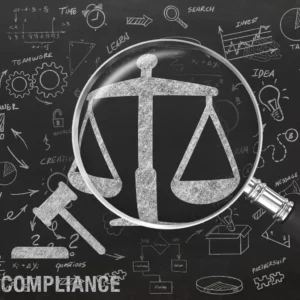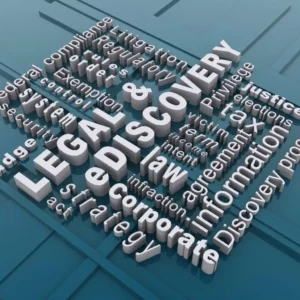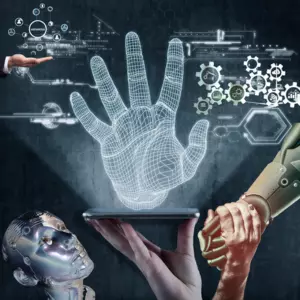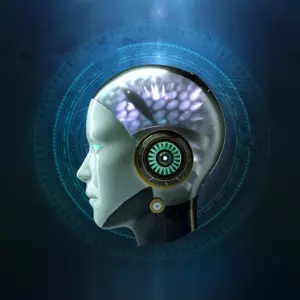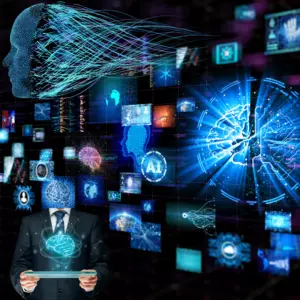
The New Mediator
AI in Alternative Dispute Resolutions
The legal landscape, renowned for its traditional practices, is on the cusp of an AI-driven revolution, particularly in Alternative Dispute Resolutions (ADR).
As disputes become intricate and the need for efficient, timely solutions becomes paramount, AI emerges as a beacon of transformation. This article delves deep into how AI is streamlining processes and offering foresight through predictive analytics, changing the face of mediation, and ensuring seamless arbitration support.
We inch closer to envisioning AI as the new mediator with every technological stride. But what does this mean for human-centric practices? And how is AI truly enhancing the ADR spectrum? Let’s journey into the heart of AI’s role in ADR and uncover the nuances of this groundbreaking integration.
Table of Contents
The Role of AI in Mediation Processes
Alternative Dispute Resolution (ADR) is evolving rapidly, with AI in Alternative Dispute Resolutions shaping its trajectory. One key area of transformation is the mediation process. Traditionally, human mediators were solely responsible for facilitating conversations, ensuring fairness, and working towards conflict resolution. Today, AI in mediation and negotiation plays a pivotal role, aiding mediators in understanding the nuances of disputes. Leveraging natural language processing in ADR documentation, AI can swiftly analyze historical cases, extracting insights and patterns that humans might overlook.
Moreover, AI-enhanced ADR data analysis allows for a deeper understanding of disputes, enabling mediators to predict the most likely outcomes and potential sticking points in negotiations. With machine learning for dispute prediction, mediators can anticipate contention areas, ensuring smoother proceedings. The power of predictive analytics in ADR outcome prediction can’t be overstated. Mediators can guide discussions more effectively by estimating potential outcomes based on data from similar cases. Furthermore, AI-driven ADR case management systems ensure that all parties have access to the most recent data, which aids in making informed decisions.
But how is this influencing the way ADR professionals prepare for their cases? How does integrating AI tools for ADR participant preparation change the game? And what does the future hold for AI in ADR venue and mediator selection?
Anticipating Disputes Using AI
The landscape of AI in Alternative Dispute Resolutions is vast, with its tentacles reaching into the domain of preemptive actions. Imagine the power of predicting disputes before they escalate. The key lies in machine learning for dispute prediction. These sophisticated algorithms analyze patterns from past conflicts, using AI-enhanced ADR data analysis to find common triggers or flashpoints.
These predictive models aren’t just theoretical. They’re rooted in real-world data, and thanks to natural language processing in ADR documentation, AI can sift through extensive archives, capturing subtleties that might elude human analysts. The resulting insights from this deep dive can guide professionals in understanding where disputes might arise, allowing for proactive measures.
Yet, prediction is just one part of the equation. Properly leveraging AI tools for arbitration support can offer a framework for stakeholders to address potential issues, ensuring they never snowball into full-blown conflicts. As AI becomes integrated, AI-driven ADR case management and AI tools for ADR participant preparation will undoubtedly play pivotal roles in pre-empting and managing disputes.
Still, if AI can anticipate disputes, what implications does this have for AI in mediation and negotiation in real-time situations?
Streamlining Arbitration with AI Support
The world of AI in Alternative Dispute Resolutions is not limited to mediation or predictive analytics. Arbitration, a significant pillar of ADR, stands to benefit immensely from AI’s advancements. At the heart of this transformation are AI tools for arbitration support. These tools, driven by machine learning and data analysis, enable arbitrators to make better-informed decisions.
Harnessing natural language processing in ADR documentation, AI can swiftly process vast amounts of arbitration records, agreements, and case laws, providing arbitrators with condensed, relevant insights. This expedites the arbitration process, reducing delays and overheads. Moreover, with AI-enhanced ADR data analysis, arbitrators can draw parallels with historical cases, giving them a clearer perspective on precedent and potential outcomes.
Additionally, AI-driven ADR case management optimizes the logistical aspects of arbitration. With seamless scheduling, timely notifications, and efficient record-keeping, the arbitration process becomes smoother for all involved parties. Add to this the power of predictive analytics in ADR outcome prediction, and arbitrators are equipped to set clear expectations for the disputing parties right from the onset.
But as AI becomes more embedded in the arbitration process, how might this shape the dynamics of AI in mediation and negotiation? And how will the role of human arbitrators evolve in this AI-augmented landscape?
Predicting ADR Results for Informed Decisions
In the intricate dance of AI in Alternative Dispute Resolutions, one groundbreaking application stands out: predictive analytics in ADR outcome prediction. With AI, stakeholders no longer approach disputes blindly but with a foresight born from data-driven insights.
Machine learning for dispute prediction is the primary reason behind this marvel. AI can create patterns and forecasts by analyzing vast datasets of past ADR cases, providing insights into potential outcomes. Machine learning for dispute prediction is the primary reason behind this marvel.
AI can create patterns and forecasts by analyzing vast datasets of past ADR cases, providing insights into potential outcomes. When combined with AI-enhanced ADR data analysis, this predictive prowess offers participants a clear picture, helping them form strategies and set realistic expectations.
The benefits are manifold. Natural language processing in ADR documentation ensures that no crucial information is missed, making predictions more accurate. Then, AI tools for arbitration support provide context, helping parties understand the reasons behind these predictions. This holistic view empowers stakeholders to make more informed decisions, potentially minimizing prolonged disputes.
Yet, with AI’s capability to anticipate outcomes, one can’t help but wonder: How will this predictive power influence AI in mediation and negotiation tactics? And as we harness AI to predict, how might the nature of disputes evolve in response?
Deep Diving into ADR Data with AI
Data, as they say, is the new gold. This couldn’t be truer in the context of AI in Alternative Dispute Resolutions. AI’s capacity to delve deep into vast ADR datasets brings a revolution in understanding disputes and crafting resolutions. Central to this revolution is AI-enhanced ADR data analysis.
With natural language processing in ADR documentation, AI algorithms can meticulously comb through and interpret vast swathes of legal texts, precedents, and case specifics. This deep dive is not just about volume; it’s about gaining nuanced insights that often escape even seasoned professionals.
The power of machine learning for dispute prediction enhances this further. By recognizing patterns, trends, and triggers across thousands of cases, AI offers a fresh perspective on recurring dispute issues. Combined with AI tools for arbitration support, this ensures that every piece of data, no matter how minute, can be effectively utilized in the ADR process.
Yet, questions arise as we venture deeper into this data realm with AI. How might AI in mediation and negotiation adapt to leverage these deep insights? And as AI continually refines its understanding of disputes, how will the traditional dynamics of ADR evolve?
Efficient ADR Documentation and Record-Keeping
Documentation is the backbone of any legal process, and AI in Alternative Dispute Resolutions has significantly improved this essential element. With vast amounts of information flowing in and out of ADR processes, ensuring accurate and accessible documentation is paramount. Enter natural language processing in ADR documentation, AI’s solution to the traditional challenges of record-keeping.
AI, equipped with AI-enhanced ADR data analysis, can swiftly sort, categorize, and archive information, making retrieval effortless. This efficiency is further amplified with machine learning for dispute prediction, which preemptively uses past data to organize future cases based on predicted outcomes.
Moreover, AI-driven ADR case management systems seamlessly integrate documentation into the broader ADR process. AI ensures that every stakeholder remains informed by automating updates and maintaining a dynamic, real-time database. This dynamic approach to documentation, aided by AI tools for arbitration support, can dramatically reduce human error, ensuring that the minutiae of every case are meticulously recorded.
But as AI streamlines the record-keeping process, one is prompted to ponder: How will these advances reshape AI in mediation and negotiation? And as documentation becomes increasingly digital and automated, what new challenges might emerge in ensuring its security and authenticity?
Managing ADR Cases Efficiently
The orchestration of AI in Alternative Dispute Resolutions has ushered in a new era of case management, defined by efficiency and precision. In a realm where timing, accuracy, and organization can dictate the course of disputes, AI-driven ADR case management systems are a game-changer.
At the heart of this efficiency lies AI-enhanced ADR data analysis, enabling case managers to swiftly assess case specifics, from participant profiles to historical precedents. This, paired with natural language processing in ADR documentation, ensures that every detail is captured and readily available, streamlining case review and preparation processes.
Beyond documentation, AI tools for arbitration support assist in scheduling, communication, and resource allocation. They predict potential bottlenecks, suggest optimal timelines, and ensure that participants are well-prepared, leveraging AI tools for ADR participant preparation.
Moreover, the proactive nature of machine learning for dispute prediction aids in anticipating challenges and offers insights into potential case trajectories. This predictive approach speeds up the ADR process and ensures better, data-driven decisions.
Yet, questions emerge as AI takes the helm in managing ADR cases. How will the role of human case managers transform amidst this AI revolution? And with AI managing the intricacies, can AI in mediation and negotiation further humanize the ADR experience?
Preparing Participants for ADR Processes
As AI in Alternative Dispute Resolutions innovates, a critical component emerges: equipping participants for the ADR journey. In this digital transformation era, AI tools for ADR participant preparation ensure that individuals are well-versed, confident, and ready to engage.
Harnessing AI-enhanced ADR data analysis, preparatory tools can customize briefs based on past cases, highlighting relevant precedents and potential pitfalls. This ensures participants aren’t just informed and receive insights tailored to their unique situation. Natural language processing in ADR documentation also breaks down complex legal jargon, making information accessible and understandable to everyone.
Furthermore, predictive analytics in ADR outcome prediction provide participants with a glimpse into potential outcomes. This, combined with insights from machine learning for dispute prediction, arms them with a sense of foresight, enabling more strategic planning and decision-making.
AI tools enhance logistical preparations, from scheduling to role-playing scenarios, for arbitration support. These innovations ensure that participants do so with clarity and confidence when they step into the ADR arena.
Yet, as AI refines the preparation process, one wonders: Will this newfound confidence redefine the dynamics of AI in mediation and negotiation? And as participants become AI-assisted, how might the essence of human negotiation evolve?
Selecting the Right Venue and Mediator
In the intricate dance of AI in Alternative Dispute Resolutions, selecting an appropriate venue and a skilled mediator plays a pivotal role. With AI’s intervention, this once daunting task is now streamlined, precise, and data-driven, thanks to AI in ADR venue and mediator selection.
Utilizing AI-enhanced ADR data analysis, AI algorithms assess factors like case specifics, participant preferences, and past resolutions to suggest optimal venues. These systems consider location, facilities, and past success rates, ensuring the environment is conducive to a fair and effective solution.
Machine learning has revolutionized mediator selection for dispute prediction. By analyzing a mediator’s past performance, specialization, and feedback, AI systems can match cases to mediators with a track record of success in similar disputes. This ensures that the mediator understands the intricacies and can guide participants effectively.
Further aiding the process, natural language processing in ADR documentation reviews past mediator reports and feedback, providing comprehensive profiles. This amalgamation of data ensures that both the venue and mediator are in harmony with the case’s requirements.
As AI reshapes this selection process, one can’t help but ponder: In an AI-driven selection landscape, how will mediators elevate their skills to remain relevant? And will AI in mediation and negotiation ever move beyond support to become the primary mediator?
The Transformation of ADR with AI
The world of AI in Alternative Dispute Resolutions has experienced a paradigm shift akin to a legal renaissance powered by advanced technology. A suite of AI tools and methodologies is now redefining ADR’s once-manual and exhaustive processes.
At the forefront, machine learning for dispute prediction offers a glimpse into future disputes based on historical data, allowing for proactive solutions. This proactive approach is bolstered by predictive analytics in ADR outcome prediction, providing insights into potential resolutions before deliberating.
AI in mediation and negotiation tools have morphed the traditional dialogue into a more structured, data-informed conversation, setting a new standard for approaching disputes. Concurrently, natural language processing in ADR documentation ensures that all information, from minor details to critical insights, is captured and easily retrievable.
Additionally, AI-driven ADR case management systems are weaving intelligence into the administrative fabric, automating tasks and offering a streamlined, efficient experience for all involved parties.
But amidst this transformation, a contemplative note persists: As AI continues integrating into the very soul of ADR, how will the human touch – empathy, understanding, and intuition – fit into this new paradigm? And might there come a day when AI in Alternative Dispute Resolutions becomes the primary mediator, with human support?
Conclusion: AI and the Future of ADR
The evolution of AI in Alternative Dispute Resolutions heralds a transformative era for the legal industry. With machine learning for dispute prediction, we’ve seen the proactive identification of conflicts, setting the stage for preventive measures. As technology delves into predictive analytics in ADR outcome prediction, parties can anticipate potential resolutions, shaping their strategies with foresight.
In the heart of dialogue-driven processes, AI in mediation and negotiation has infused data-backed intelligence, ensuring that conversations are based on intuition and informed by historical precedents. Combined with natural language processing in ADR documentation, this guarantees that every word, detail, and nuance is captured, making the once tedious documentation task precise and efficient.
The transformative power of AI continues beyond there. AI-enhanced ADR data analysis provides depth and granularity to information, enabling all stakeholders to dive deep into insights. The role of AI tools in arbitration support, ADR participant preparation, and even in the selection of venues and mediators underscores the comprehensive reach of this technological wave.
Yet, as we stand at this nexus, an essential reflection remains. While AI facilitates, streamlines, and predicts, the essence of ADR lies in the human touch – empathy, understanding, and genuine communication. In its vast capacity, AI should be seen as an enabler, a facilitator – the new mediator, but not the replacement. In the foreseeable future, can we envision a harmonious balance where AI in Alternative Dispute Resolutions seamlessly intertwines with human expertise, ensuring justice, fairness, and resolution? Only time and further innovation will tell.
Related Articles
- AI in Pro Bono Case Selection: Maximizing Impact
- AI in Alternative Dispute Resolutions: The New Mediator
- AI in Courtroom Support: Revolutionizing Evidence Compilation
- AI-Driven IP Management: From Patents to Trademarks
- AI-Driven Document Categorization: Legal Filing Transformed
- AI in Compliance Monitoring: Legal Standards and Predictive Oversight
- AI-Driven Legal Chatbots: Future of Attorney-Client Interactions
- AI-Driven E-Discovery Platforms: Enhanced Efficiency and Precision
- AI-driven Legal Analytics: Transforming Decision-making and Litigation Strategies
- AI-Driven Legal Research: How Technology is Reshaping the Future of Law
- AI for Contract Analysis: Streamlining Processes and Predicting Success
- Other Articles on AI Usage in Legal
- Other Articles on AI usage in different industries






